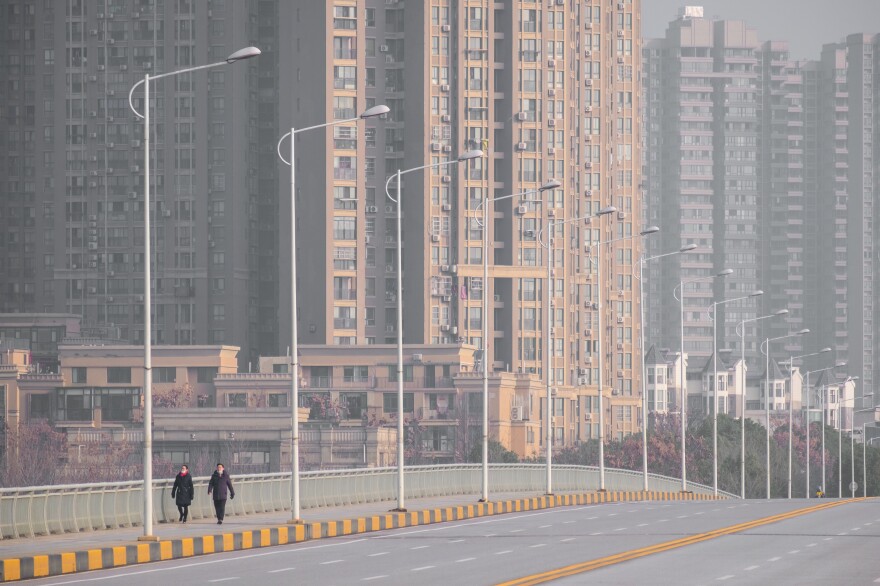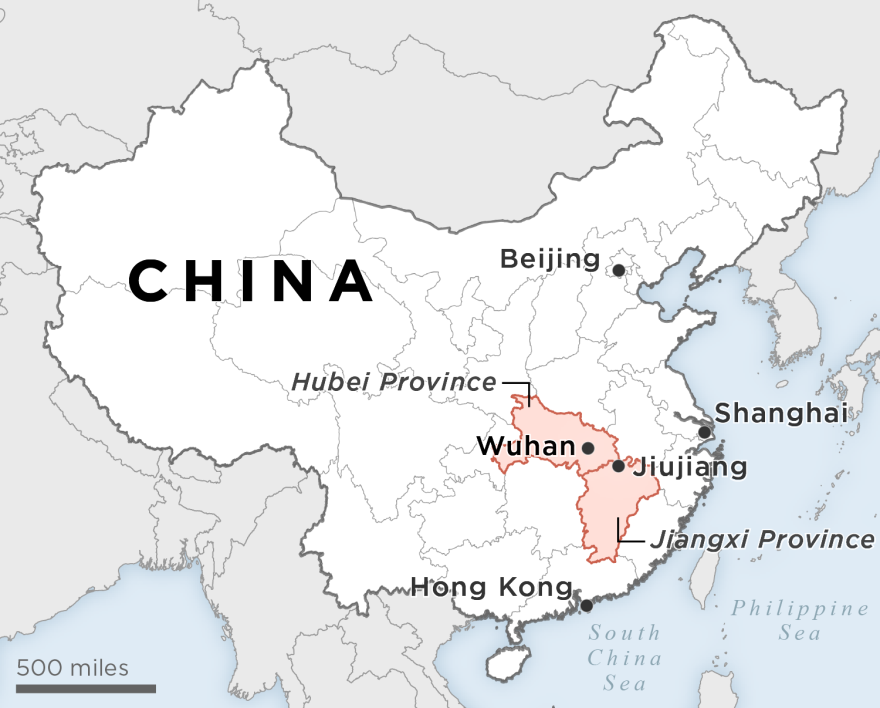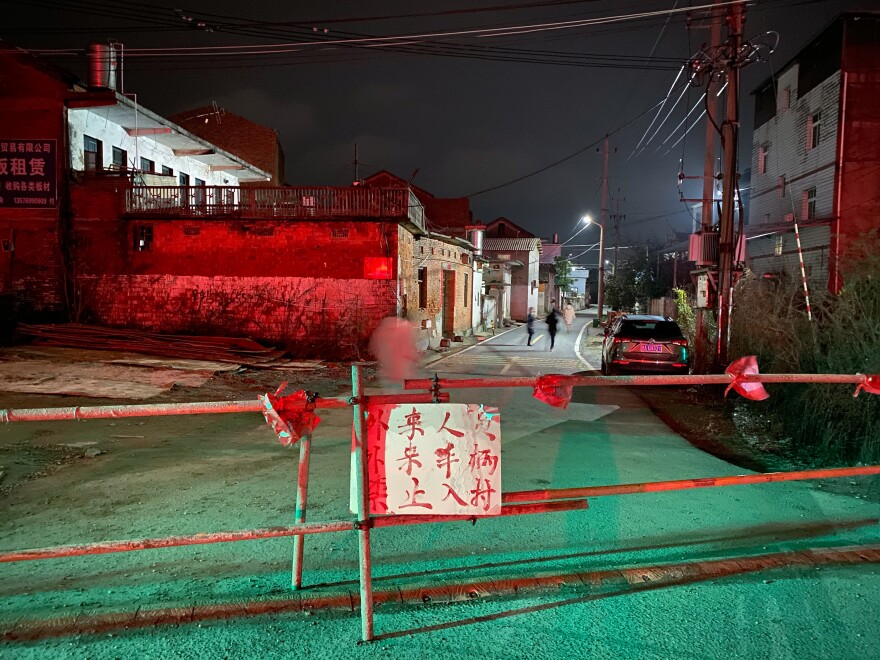More than a dozen cities in the Chinese province of Hubei are under official lockdown. And some cities and villages are taking it upon themselves to seal off their communities — even if their actions aren't legal.
It's all to prevent the spread of a new strain of coronavirus that has killed over 130 people and sickened more than 5,900 in China.
What do these measures consist of? And do scientists think they will help contain this rapidly spreading virus?
The strictest quarantine is in Wuhan, a city of 11 million that's the epicenter of the outbreak.

Wuhan has gradually shut down all transportation channels for entering and leaving the city — no flights, trains, buses or boats. Movements within the city have become highly restricted as private cars are banned from traveling on the streets unless explicitly authorized by the government.

Speaking on Sunday, Wuhan's mayor admitted that 5 million residents had been able to leave the city before the quarantine was put in place, many for the Lunar New Year holiday, which began last week. The incubation period for the virus is not yet known but currently the range is believed to be between two and 14 days. Beijing authorities are asking anyone who has visited Hubei province this month to self-quarantine for two weeks in case they contracted the virus but have not yet shown symptoms.
In the neighboring province of Jiangxi is Jiujiang, a city of 4.7 million, where four cases have been diagnosed. It's not under official lockdown but is screening people's temperatures and blocking outside cars and long-distance buses from entering. On a visit to the city on Monday and Tuesday, only a handful of residents could be seen walking along its streets, almost all wearing face masks. People are allowed to drive their own cars, but cars with license plates from other parts of China are not permitted in. There is limited public transport. The holiday from work over Lunar New Year has been extended.

Jiujiang is also focused on identifying and isolating those with a travel history from Wuhan both by asking people to come forward and also encouraging others to report on their neighbors.
And health ministry workers are posted at makeshift checkpoints on China's interprovincial highways into Jiujiang, where all drivers and passengers must undergo temperature screenings if driving between cities. Anyone with a temperature higher than 37.3 degrees Celsius (99.14 Fahrenheit) will be pulled aside for further examination.
It takes a great deal of effort to implement such measures — distributing thermometers at hotels and other locations, teaching folks how to use them and stationing guards at highway exits.
In addition to official measures, suspicion and an overabundance of caution have led many Chinese villages and towns around Jiujiang to take on voluntary, preventative measures.

On the outskirts of Jiujiang, I find myself barred from entering a cluster of 18 villages where several thousand people live. In one village, a hand-painted sign stuck between the metal bars blocking the main road reads, "Outside people and cars forbidden from entering."
The entrance to Zhaoping, a village of around 2,000, is now obstructed by bamboo sticks tied with red trash bags and guarded around the clock by village cadres, kept warm inside a hastily-built shed.
Residents say at least hundreds of migrant workers who work in Wuhan returned home, to this village, for the Lunar New Year.
"So we have them under 24-hour supervision now," says a village guard. "They can't leave."
Asked whether he's worried that food will be in short supply, the guard says residents largely depend on their own farmland for sustenance. Other villagers had the same viewpoint.
Notices posted online show similar measures are being implemented in villages across Jiangxi, which shares a border with Hubei province, where the virus was first identified. Villagers across China are blocking roads with whatever they have on hand, including boulders, large tractors and wooden spears. Some even dug up the village's asphalt road to thwart visitors in provinces adjacent to Hubei, such as Henan. Anyi County, just north of Nanchang, said Sunday it was sealing off another cluster of villages to "resolutely curb the spread of the epidemic."
"After seeing videos of villages shutting themselves off and experiencing it in my own village, I believe that quarantines in rural places could be more humane and be improved," a woman who drove to her ancestral home in Shandong province wrote in a well-known Chinese newspaper.
These rural quarantines are not legal. China's public security chief underscored in a press conference Tuesday afternoon that destroying roads and setting up unauthorized roadblocks are illegal and urged police across the country to enforce traffic regulations.
As for the official quarantine efforts, researchers believe they have the potential to help — but also raise questions about how they're carried out.
"Rather than too little, too late, I believe better late than never," says Brandon Brown, a professor at the University of California Riverside School of Medicine who was quarantined in a Singapore dorm during the SARS outbreak.
"If there are approximately 5,000 people infected with the novel coronavirus in mainland China, then quarantine measures can still be useful even if done at a late stage. The benefit is to prevent the further spread of infection. The risk is how the quarantine is done, if people comply and if important resources are cut off from the regions under quarantine.
"These quarantines must be done humanely," he adds, pointing to quarantines in "resource-poor settings where people trying to stay alive are kept behind a barbed wire fence."
"It is a bit of a challenge and really we won't know if it's effective until after we gain control and prevent significant transmission locally," says Dr. Michael Ison of Northwestern University's Feinberg School of Medicine, who does research on viral infections. Quarantines have been show to be effective in the past, he says. "For example, during the 2009 swine flu pandemic, there was a significant reduction in public events in Mexico City and that appeared to reduce the risk of transmission. So there is clear benefit. Whether or not it will be incredibly beneficial for this virus won't be known until we come through to the other side."
Copyright 2021 NPR. To see more, visit https://www.npr.org.





